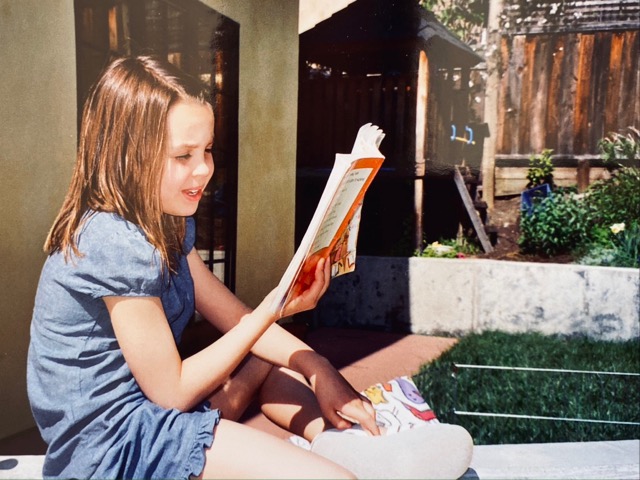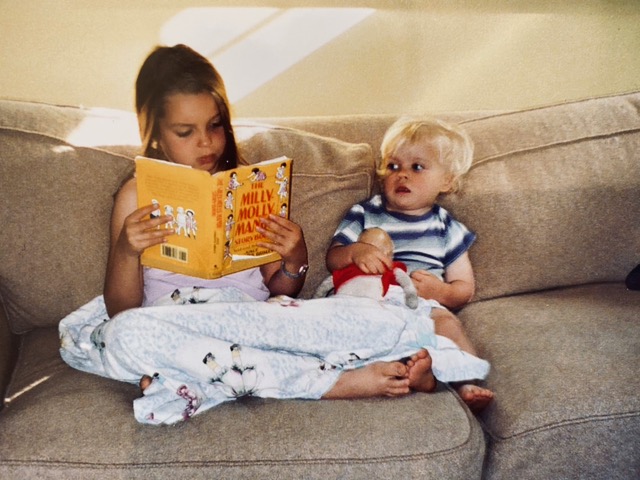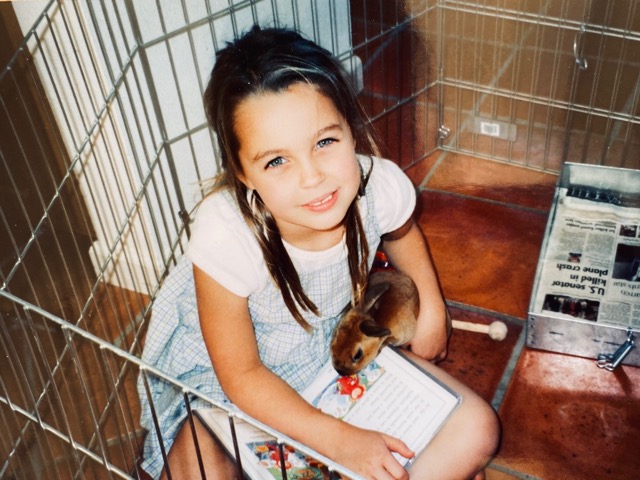Last week I received a comment on an old post–one from five years ago, about T, titled, “I Don’t Like Reading”–from a reader named Sarah. I responded to her in the comments, and over the conversation that followed, I realized that there might be other parents out there feeling similar doubts right now. So with Sarah’s permission, I’m sharing the beginning of our conversation here.
Patricia, I have been a long, longtime follower of you on Instagram but had no idea you have a blog (and one that’s so lovely to read in a variety of ways).
I also had no idea you are a homeschooler. This realization — and this post in particular — comes at the perfect time, as we are finishing up our year of COVID homeschooling 1st grade and our 6yo has begun to tell us, at least every few days, that she hates reading. (She has been slow to learn to read — is only able to get through early readers, though I suspect that’s less an ability issue and more a willingness one, though she is a happy recipient of all our reading aloud and she devours audiobooks so fast I can barely keep them coming from the library.)
I fret. Our homeschooling experiment — forced on us during this pandemic year when we wanted more for her than sitting on Zoom 6+ hours a day — feels mostly like a failure. She has learned plenty this year, but not because I’ve been a great teacher — mostly I have had to demand that work gets done, and this is so far from the homeschooling parent I wanted to be it hurts. No wonder the kid “hates to read.” I pray (literally) that we have not ruined reading for her forever.
My instinct now, near the end of our formal school year, is to drop the issue — to just continue to read and read and read aloud to her, keep the audiobooks coming, listen to her read when she feels like it rather than as a mandate for “school” — and hope for the best when she returns to public school for 2nd grade in September. This is what I want to do, certainly.
I never knew homeschooling would feel so fraught and risky.
Thank you for all your reflections here and on Instagram. Thank you for reading (listening to) this long comment. I will buy your memoir the moment it comes out.
Dearest Sarah,
I’m going to try to convince you that your year has not been a failure. Because there is so much good stuff happening your comment! It’s just getting slightly obscured beneath the fretting and the fears.
Doubt and fret are pretty typical for homeschooling parents, especially at first. And those feelings never completely disappear, no matter how long you homeschool. But I’m going to put “homeschooling” in quotes here because the experience most families have had this past year is not typical of non-pandemic homeschooling. I can’t tell from your comment if your daughter was doing work assigned by her school, or doing work you thought was necessary to “keep up,” knowing she’d be going back to public school next year. [In a follow-up email, I learned that Sarah had pulled her daughter from school and was homeschooling while also working full-time.] Either situation puts the parent in an impossible position. It’s like the nightmare of nagging about getting homework done–but all day, every day! Most homeschoolers–even those who follow a curriculum, which many don’t–begin to drift from “assignments” over time. They begin to see the power in activities the kids are truly interested in, and slowly learn to let those activities take more space in the day. But for many parents–hand raised here!–the move away from a school model can be slow. It takes most of us more than a year to get the school way of thinking out of our minds.
And “homeschooling” this past year meant holding on to all the hardest parts of homeschooling for a parent–the time, the responsibility, the fears of doing things “wrong”–without so many of the things that make homeschooling a delight. Library trips. Visits to museums and aquariums and historical sites and living history trips where you live like gold miners for a weekend. The weekly park days with other homeschoolers, and the play dates, and the sleepovers. The book clubs and the science clubs and the writer’s workshops and the groups based on everything-under-the-sun-the-kids-are-into: baseball and American Girl dolls and Harry Potter and poetry and the history of rock and roll. Talent shows and history fairs. Camping trips. I could go on.
In other words, this was a very tough year to try a “homeschooling experiment.” Add on the stress we’ve all been under and it’s pretty much the worst year you could imagine to experiment with homeschooling.
Let’s talk about your daughter saying she hates reading. Actually, let’s talk about how when my oldest was seven, I made him swat a stack of papers off the table and stomp up the stairs hollering, “I hate writing!” There’s a longer version of the story here, but suffice it to say that I was so wrapped up in keeping my kid up with what kids do in school that I made him despise the very thing I love. (And I know from Instagram how much reading means to you, Sarah.) But guess what? Despite my ineptitude, I did not ruin writing for him forever! I cried in heaving dramatic sobs and then pulled myself together and did just what your instincts are telling you to do: I dropped it. I stopped making him write. I started taking dictation from him instead. (Lots more on that here.) I started a writer’s workshop, so he could share his dictated writing with friends. He started writing his own Captain Underpants comics, and those comics became longer stories that he wrote on his own, and before long the kid was writing pages and pages and asking me for writerly advice.
My daughter sounds so much like your daughter. At seven, she did not show much interest in the early readers I dutifully checked out at the library week after week, but she adored being read to and listened to audiobooks by the hour, sometimes starting one over the minute it ended. (May I go on a tangent here about audiobooks? Because I wish every parent was given a brochure on the wonders of audiobooks with their child’s birth certificate. I admit that when my daughter started her endless listening, I felt guilty about it. It seemed to be a passive sort of entertainment, and a sort of “cheating” way of reading. Over time I changed my tune. I started noticing the vocabulary she was picking up, words like sodden and appreciated. I will never forget the day she snapped at her brother, “You have a severe lack of moral stamina!” and it took me a sec to realize she’d picked up that phrase from a Lemony Snicket book. Only after she started reading–more on that below–did I recognize how much audiobooks had provided a scaffold for her. She could make insightful guesses at words because she knew how sentences flowed. But what really sold me on audiobooks was facilitating writer’s workshops for many years. I could always tell the kids who listened to lots of audiobooks–they had a flow and pacing and rhythm to their writing that even the most avid readers didn’t quite have. And they knew how to read their work with life and drama, like pros. I’ve been proclaiming my love for audiobooks ever since.)
But back to reading. Because my daughter was my second child, I had learned a thing or two. I did not want her to holler, “I hate reading!” the way her brother had hollered, “I hate writing!” So I didn’t push. It was incredibly hard, though, because as you know, schools assume kids will read at six. The reason for that, of course, is that it’s easier to teach a large group of children if they’re all able to read. But there’s research–and I’m sorry not to chase it down for you–that tells us that outside of school, the average age for reading is more like eight or nine! I’d had it easy with my oldest–he’s a very visual kid and he read early. I began to understand that my daughter–especially with her unabashed audiobook love–is a more auditory learner. Don’t make her hate reading, don’t make her hate reading I’d tell myself, and I did precisely what your instincts are telling you to do. I read and read and read aloud to her and kept the audiobooks coming. I didn’t ask her to read aloud. I kept checking out the easy readers and left them lying around temptingly, mentioning them once, and then keeping my mouth shut. So freaking difficult.

Something shifted when she was about seven-and-a-half. She started picking up books and reading them, and in a matter of months the easy readers became middle-readers became chapter books like Ramona the Pest. She read constantly. We couldn’t keep enough library books around for her. At 25, she’s still a big reader. By kid #3, I knew an auditory learner when I saw one. I didn’t even bother pushing early readers on him–but soon recognized how much he loved comics. A few months before he turned eight, a few carefully-curated-by-me, easy-to-read comics hooked him and off he went. (Though he reads constantly, at 19 he’s not a book-lover like his siblings are, but I’ve come to terms with that, as I know you know, based on where you left this comment. 🙂 )

Here’s what I really want to say to you, Sarah. This year has not been a failure. You are getting so many things right. You are learning to put the school model aside and to trust your instincts. That is the most important thing a homeschooling parent can do–it’s the most important thing, I think, any parent can do. That’s precisely what I learn in the first chapter of my memoir draft, and what I keep learning as the draft goes on, chapter by chapter, year by year. Trust your gut. It can be a slow awakening, but an essential one.
When you write that you suspect your daughter’s “slowness” to read is “less an ability issue and more a willingness one,” I see a mother who is paying close attention to her child, and understanding her. I see that attention, too, when you write, “she has learned plenty this year, but not because I’ve been a great teacher.” Well, it took me many years to understand that the most important things my kids learned, they taught themselves. 🙂 I stopped even thinking of myself as a teacher–a big shift for someone who had taught elementary school!–and began considering myself a facilitator. (Or, as Austin Kleon puts it: I’ve always felt that I was more of a librarian for my kids.) You are already setting the ground for that sort of self-initiated learning; I see it when you write, “she devours audiobooks so fast I can barely keep them coming from the library.” Here is a mother who is providing just the sort of environment her children need for the richest learning to happen.
You are figuring it all out, dear Sarah, despite the chaotic, unsure world that swirls around us.
Your comment means more to me than you know. In the past few months I’ve had my own doubts and fears as I work on my memoir. Will my writing ever be good enough? Will I ever finish this thing? But your tender words here remind me who I’m writing for. I need to do what you need to do. We need to trust our guts, and we need to keep going.
xo, Patricia
Sarah emailed me a beautiful, heartfelt response that arrived–without her knowing it–on my birthday, a gift. I hope you’ll check out Can We Read, her wonderful weekly newsletter about children’s books. You’ll see why it matters so much to her that she do right with her daughter when it comes to reading. (And all of us experienced homeschoolers–the ones who have been through the fretting and fearing, and made all the mistakes–will nod our heads and say, yep, she’s doing it so right.)


This is fantastic, Patricia! Your generous spirit shines through as you notice all the things Sarah is getting right – we never really give ourselves enough credit, do we? And I can’t help repeating it here in case anyone missed the point – No one gets it right the first time! Instead of teacher, I use the word curator to describe my role as a homeschooling parent.
My kids listen to a LOT of audiobooks and you describe perfectly what I see in them – although I will add that they can also do a lot of awesome accents, from hearing such a wide range of narrators. It can instill a real flair for the dramatic.
Thanks for agreeing to share this Sarah!
Hi Gloria, fellow didn’t-get-it-right-the-first-time, curator-for-kids! (Curator, yes, love that!) We don’t give ourselves credit; sometimes it takes other people to notice all we’re doing that’s right and good. Thank you for showing up to back me up and cheer on all the parents who tried so, so hard this year. (And accents–absolutely! My youngest is so good that he dreams of making a career of sketch comedy. SNL, here he comes! Meanwhile I’m laughing away my last few months until he’s off to college…)
I loved reading your response to Sarah. Your writing is so exquisite in its clarity, choice of words, and flow. I remember my homeschooling exploration that was forced upon us because, at the time, our son was seen not being fit for school because of behavioral issues. During the three years of homeschooling, you and a handful of other experienced homeschooling parents of Alameda Oakland Homeschoolers were the life-saving resources I needed for our homeschooling journey. It lessened the anxiety a lot. My son threw a fit whenever asked to write. Understanding brain plasticity, I knew I did not want to drive that unhealthy pattern, so I dropped writing after a few weeks. After my son did not write one piece for literally 2.5 years, he wrote a perfect persuasive essay because he wanted a pocket knife after learning knife skills in the East Bay Trackers program. It is impressive to witness how fast motivation builds skill. When we stop overly structuring our children’s learning environment, they thrive, each in their way. Alexander became the most relaxed kid during the homeschooling years. Later, in middle school, teachers told me that he had no problem following the curriculum. They did not notice any lack in his knowledge. Because Alexander had dyslexia, I made sure to read to him daily. Sometimes we became so enthralled in the story we would read for hours. He also loved audiobooks. Within a year, he became an independent and avid reader.
Hi Gabi! Thank you for sharing yours and Alexander’s story–it’s so great to hear how kids can learn differently outside school expectations. “When we stop overly structuring our children’s learning environment, they thrive, each in their way.” Yes! That can be such a hard lesson for a parent to learn, because we’ve all been trained to think we need to take charge. Here’s to getting so enthralled in a story that you’d read for hours. Those were the days! xo.